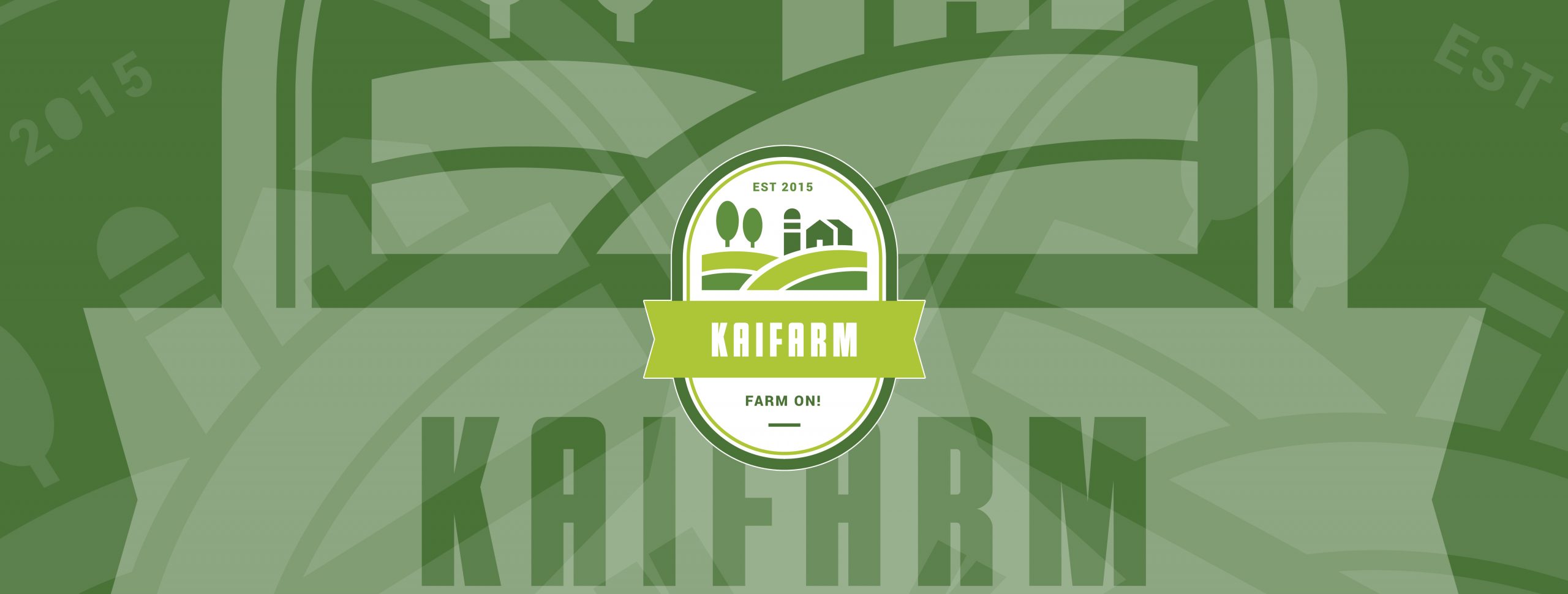

Revolutionizing Coffee Supply Chains: KAI Farm’s Journey with Blockchain Technology
In the pursuit of sustainable agricultural development, KAI Farm has made significant strides by integrating cutting-edge technology into its farm and factory management. One of the most innovative implementations at KAI Farm is the utilization of blockchain technology for managing and tracing the origin of Robusta coffee beans.
The Challenge of Supply Chain Transparency in the Coffee Industry
The coffee supply chain is inherently complex, with multiple intermediaries involved from farm to cup. This complexity poses several challenges:
∎ Opacity and Complexity: Traditional coffee supply chains often lack transparency, making it difficult to trace the journey of coffee beans. Multiple middlemen, including exporters, importers, and distributors, can obscure the coffee’s origin and production practices.
∎ Quality Control: Maintaining consistent coffee quality throughout the supply chain is a persistent challenge. Beans from different sources might get mixed, making it challenging to ensure that the coffee meets the desired quality standards.
∎ Ethical Sourcing: Consumers are increasingly concerned about the ethical and environmental aspects of the products they consume. Without transparency, it becomes hard to verify that coffee is sourced responsibly and sustainably.
∎ Counterfeiting: Fraudulent practices, such as the adulteration or mislabeling of coffee, are prevalent in the industry. Lack of transparency makes it easier for counterfeit products to infiltrate the market.
∎ Inefficiencies: The involvement of multiple intermediaries can lead to inefficiencies in the supply chain, resulting in higher costs and longer lead times from farm to consumer.
∎ Market Access: Small-scale coffee producers often face difficulties in accessing international markets due to limited resources and a lack of direct connections with buyers. Transparency can bridge this gap.
The coffee industry’s challenges in achieving transparency have long been a concern for both producers and consumers. However, the adoption of blockchain technology by KAI Farm presents a promising solution to these issues.
How Blockchain Transforms Coffee Supply Chains
Blockchain, a decentralized and immutable ledger, has emerged as a game-changer for various industries, including agriculture. At KAI Farm, it serves as a transparent and tamper-proof platform for documenting each stage of Robusta coffee production, from cultivation to distribution.
Traceability: Ensuring the Coffee’s Journey from Farm to Cup
One of the most significant advantages of using blockchain technology in managing coffee supply chains is the ability to establish traceability.
∎ Unprecedented Visibility: Blockchain provides unprecedented visibility into the journey of coffee beans. Each step in the production process, from the moment the coffee cherries are harvested to the final brew, is meticulously recorded and stored in a secure, tamper-proof digital ledger.
∎ Immutable Records: Once data is recorded on the blockchain, it becomes immutable. This means that no one can alter or delete the information, ensuring the integrity of the records. Each batch of coffee is given a unique digital fingerprint, allowing for easy identification and verification.
∎ Real-time Updates: Every stakeholder in the supply chain, from the coffee farmer to the consumer, can access real-time updates on the status and location of the coffee. This transparency eliminates uncertainties and ambiguities that often plague traditional supply chains.
∎ Instant Verification: Consumers can scan a QR code or use a mobile app to verify the authenticity and origin of the coffee they’re purchasing. This empowers consumers with the ability to make informed choices, supporting sustainable and ethical practices.
∎ Quality Assurance: Beyond origin, blockchain also allows for the recording of quality parameters. Factors such as altitude, climate, and processing methods are documented, ensuring that the coffee meets the desired quality standards consistently.
∎ Supply Chain Efficiency: The transparency offered by blockchain reduces the time and resources needed for dispute resolution. In cases of quality issues or disputes, the blockchain’s immutable records provide a clear, trustworthy source of information.
∎ Sustainability Compliance: Blockchain technology can also document sustainable practices, such as fair trade certifications, organic farming methods, and ethical labor practices, providing a comprehensive view of a coffee’s sustainability credentials.
∎ Reduced Counterfeiting: The immutability of blockchain records makes it exceedingly difficult for counterfeit coffee to infiltrate the supply chain. Counterfeit products can be quickly identified and removed from circulation.
blockchain technology revolutionizes traceability in the coffee industry, ensuring that every cup of coffee can be traced back to its source with unprecedented accuracy. This level of transparency not only benefits producers and consumers but also bolsters the coffee industry’s commitment to ethical and sustainable practices.
Quality Assurance: Elevating Coffee Quality through Blockchain
Quality assurance is a paramount concern in the coffee industry, and blockchain technology plays a pivotal role in maintaining and enhancing the quality of coffee beans.
∎ Precise Data Collection: Blockchain technology allows for the precise collection of data at every stage of coffee production. Factors like soil conditions, climate, altitude, and processing methods are recorded. This data provides valuable insights into the conditions that influence coffee quality.
∎ Consistency in Quality: The ability to record and maintain comprehensive data on coffee production practices ensures consistency in the quality of the coffee. Farmers can make informed decisions based on historical data, optimizing cultivation methods to produce high-quality beans consistently.
∎ Environmental Impact: Sustainable practices, such as eco-friendly farming and responsible resource management, can be recorded and verified on the blockchain. This not only supports coffee quality but also emphasizes environmentally conscious production.
∎ Real-time Monitoring: Blockchain enables real-time monitoring of quality parameters. Any deviations from the desired quality standards can be quickly identified and addressed, reducing the risk of subpar coffee making its way into the market.
∎ Origin Authentication: Through blockchain’s transparency, consumers can verify that the coffee they purchase meets specific quality criteria. They can have confidence that the coffee is truly from the origin claimed and meets the quality standards they expect.
∎ Quality Certifications: Blockchain can store certifications such as Fair Trade or Organic, further assuring consumers of the coffee’s quality and ethical production methods. These certifications can be easily accessed by consumers through blockchain records.
∎ Feedback Loops: Blockchain technology can facilitate feedback loops between various stakeholders in the supply chain. Producers can receive feedback on the quality of their beans, enabling continuous improvement in their farming and processing methods.
∎ Reduced Waste: With enhanced quality assurance, there is a reduction in the likelihood of lower-grade beans entering the supply chain. This minimizes waste and ensures that only high-quality beans are processed and distributed.
blockchain technology empowers coffee producers to maintain the quality of their beans with meticulous data collection and monitoring. This not only benefits producers by improving the consistency of their product but also gives consumers the assurance that they are enjoying a premium, ethically sourced coffee experience. Quality assurance through blockchain is a significant step forward in the coffee industry, fostering trust and satisfaction among both producers and consumers.
Smart Contracts: Streamlining Transactions and Relationships
Smart contracts are a central component of blockchain technology, and in the coffee supply chain, they play a vital role in streamlining transactions and enhancing relationships among stakeholders.
∎ Automated Transactions: Smart contracts are self-executing contracts with predefined rules and conditions. In the coffee supply chain, they automate transactions at various stages, such as payment to coffee farmers, shipping fees, and quality inspections. These automated transactions reduce the need for intermediaries, making the supply chain more efficient and cost-effective.
∎ Trust and Transparency: Smart contracts are tamper-proof, ensuring that all parties involved can trust the process. This transparency builds trust among coffee producers, buyers, and other stakeholders, as they can independently verify the terms of the contract and the execution of transactions.
∎ Reduced Disputes: Because smart contracts execute automatically when predefined conditions are met, disputes are minimized. For example, once coffee beans meet the required quality standards, payment is released to the farmer. This reduces the potential for disagreements and delays in the payment process.
∎ Cost Savings: By eliminating intermediaries and automating transactions, smart contracts reduce operational costs throughout the supply chain. This cost-effectiveness benefits both coffee producers and buyers, as it allows for fairer pricing and more accessible market access for smaller producers.
∎ Accessibility: Smart contracts make it easier for small-scale coffee producers to enter international markets. They no longer need to rely on traditional intermediaries, as smart contracts enable direct transactions with buyers, ensuring they receive fair compensation for their products.
∎ Data Security: Smart contracts are secured by blockchain technology, making them resistant to tampering and fraud. This ensures the confidentiality and integrity of sensitive data, such as pricing agreements and quality assessments.
∎ Real-time Information: Parties in the supply chain can access real-time information on the status of transactions and the progress of coffee shipments. This instant access to information enhances decision-making and responsiveness.
∎ Sustainability Incentives: Smart contracts can also incorporate sustainability criteria. For instance, they can automatically reward coffee producers with bonuses if their beans meet certain sustainability or ethical standards, further encouraging responsible practices.
smart contracts are a cornerstone of blockchain technology, revolutionizing the coffee supply chain by automating transactions and fostering trust and transparency. They not only streamline operations but also open up new possibilities for direct relationships between coffee producers and buyers, with financial benefits for both and a heightened emphasis on sustainability and responsible practices.
Consumer Confidence: Empowering Coffee Enthusiasts
Consumer confidence is a critical aspect of the coffee industry, and blockchain technology plays a pivotal role in empowering coffee enthusiasts with trust and transparency.
∎ Verification of Authenticity: Blockchain allows consumers to easily verify the authenticity of the coffee they purchase. By scanning a QR code or accessing a mobile app, consumers can trace the journey of their coffee beans from the farm to their cup. This verification assures them that they are enjoying a genuine product, free from adulteration or counterfeiting.
∎ Source Authentication: Beyond authenticity, blockchain offers source authentication. Consumers can access detailed information about the coffee’s origin, including the region, farm, and even the specific plot where the beans were cultivated. This not only satisfies curiosity but also lets coffee lovers appreciate the unique characteristics of different coffee varieties.
∎ Quality Assurance: Blockchain technology provides transparency regarding the quality of the coffee. Consumers can access records of quality assessments, including factors like altitude, climate conditions, and processing methods. This information assures them that they are getting a high-quality product that aligns with their preferences.
∎ Ethical and Sustainable Practices: Concerns about ethical sourcing and sustainability are increasingly important for consumers. Blockchain can highlight certifications such as Fair Trade or organic farming, as well as responsible labor practices. This transparency supports the choices of consumers who prioritize ethical and environmentally conscious products.
∎ Supply Chain Insights: With blockchain, consumers gain insights into the coffee supply chain itself. They can see how coffee beans are processed, packaged, and transported. This knowledge contributes to a deeper appreciation of the craftsmanship and effort that goes into producing their coffee.
∎ Enhanced Trust: The immutability of blockchain records and the elimination of intermediaries instill trust in consumers. They know that the information they access is reliable and not subject to manipulation or fraud.
∎ Informed Choices: Armed with comprehensive information, consumers can make informed choices about the coffee they purchase. They can select coffee that aligns with their values, taste preferences, and desire for authenticity.
∎ Feedback Mechanism: Blockchain technology can also facilitate feedback loops. Consumers can provide feedback on the coffee they enjoy, which can then be used to improve the coffee production process continually.
blockchain technology is a game-changer for consumer confidence in the coffee industry. It empowers coffee enthusiasts with the ability to verify the authenticity and quality of their coffee, explore its origin, and make choices that align with their values. This newfound transparency fosters trust and empowers consumers to be more discerning and satisfied with their coffee choices, ultimately benefiting both coffee producers and consumers.
Real-World Impact: Blockchain Revolutionizing the Coffee Industry
Blockchain technology is not just a theoretical concept; it’s making a tangible impact in the coffee industry.
∎ Improved Efficiency: Blockchain streamlines the entire coffee supply chain, reducing administrative burdens and paperwork. This efficiency leads to quicker transactions, reduced delays, and ultimately, fresher coffee reaching consumers.
∎ Cost Reduction: By cutting out intermediaries and automating transactions, blockchain technology reduces operational costs. This cost-effectiveness benefits both coffee producers, who can receive fairer compensation, and consumers, who can potentially enjoy more competitive pricing.
∎ Direct Relationships: Blockchain enables direct relationships between coffee producers and buyers, fostering trust and collaboration. This opens up opportunities for small-scale farmers to access international markets without relying on traditional intermediaries.
∎ Traceability: The ability to trace coffee from its origin to the cup ensures the integrity and authenticity of the product. This empowers consumers with the knowledge that they are enjoying coffee that is exactly what it claims to be, from a specific source and adhering to quality and sustainability standards.
∎ Sustainability Commitment: Blockchain showcases a coffee producer’s commitment to sustainability. Certifications like Fair Trade and organic farming practices are transparently recorded, making it easy for consumers to support ethical and environmentally responsible products.
∎ Ethical Sourcing: Blockchain technology strengthens the ethical aspect of coffee sourcing. The ability to verify ethical labor practices and fair compensation for coffee farmers instills confidence that consumers are supporting responsible and just supply chains.
∎ Reducing Counterfeiting: The immutability of blockchain records makes it exceedingly difficult for counterfeit or low-quality coffee to infiltrate the market. This means that consumers can be confident that the coffee they purchase is genuine and high-quality.
∎ Feedback-Driven Improvement: Blockchain’s transparency and direct communication between stakeholders foster a feedback-driven approach to quality improvement. Producers can receive real-time feedback on their coffee, allowing them to continuously enhance their product.
∎ Global Inspiration: KAI Farm’s journey with blockchain sets an example for the coffee industry as a whole. As other farms and producers adopt similar technology, the industry is moving toward greater transparency, sustainability, and consumer-centric practices.
blockchain is making the coffee industry more transparent, efficient, and responsible. The impact is felt from the farms where coffee is grown to the cups where it’s enjoyed, enhancing the entire coffee experience for producers and consumers alike. This transformation is not just a theoretical concept but a real-world evolution that is reshaping the coffee supply chain.
Future Prospects: The Ongoing Evolution of Blockchain in Coffee
As blockchain technology continues to gain traction in the coffee industry, its future prospects hold great promise.
∎ Greater Supply Chain Transparency: The full potential of blockchain in coffee supply chains is yet to be realized. In the future, we can expect even greater levels of transparency, where every detail of coffee production, from the soil conditions to packaging, is documented. This transparency will not only enhance trust but also lead to a deeper understanding of coffee’s journey.
∎ Enhanced Sustainability Tracking: As sustainability becomes an ever more crucial concern, blockchain will further enhance the tracking of sustainable practices. Consumers will be able to easily identify and support coffee products that align with their environmental and ethical values.
∎ Improved Smart Contracts: Smart contracts are likely to become more sophisticated. These contracts could adapt to changing conditions and offer automated dispute resolution mechanisms, further reducing the need for intermediaries and ensuring fair and efficient transactions.
∎ Integration with IoT: The integration of the Internet of Things (IoT) with blockchain technology will allow for even more real-time data collection. Sensors in coffee farms and processing facilities can transmit data directly to the blockchain, enabling immediate monitoring and adjustments.
∎ Certification Validation: Blockchain can simplify the verification of certifications and standards. Consumers can rely on the blockchain to validate claims regarding organic, Fair Trade, or other certifications, ensuring that they are purchasing coffee that meets specific criteria.
∎ Direct-to-Consumer Sales: With blockchain, small-scale coffee producers can explore direct-to-consumer sales models, reducing the dependency on larger distribution networks. This opens up opportunities for personalized coffee experiences for consumers and better returns for producers.
∎ Continued Industry Adoption: As more coffee farms and industry players recognize the benefits of blockchain technology, its adoption will likely continue to grow. This trend will make blockchain an industry standard, making the coffee supply chain more efficient and consumer-friendly.
∎ Global Inspiration: KAI Farm’s pioneering use of blockchain serves as inspiration for other coffee producers worldwide. The success of this technology at KAI Farm can encourage more farms to embrace it, leading to a broader transformation of the coffee industry.
the future prospects for blockchain in the coffee supply chain are exciting. With ongoing advancements in technology and increased adoption, we can expect an even more transparent, efficient, and sustainable coffee industry. Blockchain’s impact will continue to benefit coffee producers, consumers, and the environment, further enhancing the coffee experience for all.
In conclusion, KAI Farm’s integration of blockchain technology into its coffee supply chain management is a testament to its commitment to sustainable agriculture and transparency. It showcases the potential for blockchain to revolutionize the coffee industry by ensuring the traceability and quality of coffee beans. This innovation not only benefits the farm but also empowers consumers with the knowledge that their coffee is truly ethically sourced.
Dr. James Tran Nguyen
Co-Founder, Chief Strategy Officer & Vice Chairman of KAI Holdings


